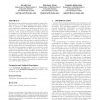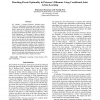24 search results - page 4 / 5 » On No-Regret Learning, Fictitious Play, and Nash Equilibrium |
ECML
2003
Springer
13 years 10 months ago
2003
Springer
Abstract. Most of multi-agent reinforcement learning algorithms aim to converge to a Nash equilibrium, but a Nash equilibrium does not necessarily mean a desirable result. On the o...
ATAL
2003
Springer
13 years 10 months ago
2003
Springer
Multiagent learning literature has investigated iterated twoplayer games to develop mechanisms that allow agents to learn to converge on Nash Equilibrium strategy profiles. Such ...
AI
2004
Springer
13 years 5 months ago
2004
Springer
Efficient Learning Equilibrium (ELE) is a natural solution concept for multi-agent encounters with incomplete information. It requires the learning algorithms themselves to be in ...
AAMAS
2007
Springer
13 years 5 months ago
2007
Springer
We consider a repeated Prisoner’s Dilemma game where two independent learning agents play against each other. We assume that the players can observe each others’ action but ar...
ATAL
2006
Springer
13 years 9 months ago
2006
Springer
Learning to converge to an efficient, i.e., Pareto-optimal Nash equilibrium of the repeated game is an open problem in multiagent learning. Our goal is to facilitate the learning ...


